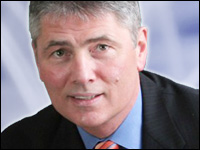
A new year! Blank screen! OK, let’s talk!
I think sustainability will be a big theme for me from this year onward. If your idea of sustainability is mostly about rain forest preservation and similar topics, I hope you will read on and think new.
I have given a lot of thought to the concept and done a fair amount of reading, and the thing that keeps coming back to me is that sustainability is only partly about the rain forests. It’s also about understanding that, for the moment at least, economic growth might look a bit different than it did in the last decade.
Finding Main Street
The difference boils down to expanding markets vs. what Geoffrey Moore called “Main Street.” If you’ve read the maestro’s works you have encountered the idea of Main Street as the place you get to after the whirlwind of exponential growth. In market after market, I see the Main Street phenomenon.
Main Street is where you end up — if you are lucky — after you’ve invented a category that drove a new niche. If you are not lucky, you are out of business or the subject of an acquisition, so we don’t need to spend a lot of time on that.
There is an established market on Main Street that needs to be serviced, marketed to and sold to. However, the market is not the big green field that existed when you started. Main Street’s marketplace is filled with existing customers and a few credible competitors, and you spend your time playing games of take-away. In other words, there are few net new or virgin customers, so if you intend to grow your business, you will need to capture it by replacing a competitor in an account or upgrading a customer. Another name for this is “zero-sum,” as in “I win, you lose” — net change: nada. That doesn’t sound like a lot of fun, and it isn’t, but this only happens if you play the game badly, which is to say, by the old rules.
The old rules, defined as what you did in the exponential growth phase of your life, involved chasing a homogeneous market with version one of a vanilla product. As versions proliferated, you might have found it hard to figure out what your customers wanted because that homogeneous market was fracturing into many smaller markets that you’ve been trying to address with product line extensions.
The Sustainability Factor
I think this is where sustainability comes in. It starts with the realization that there are only so many customers, and your growth depends on understanding them better than the next guy so that you can sell them more. Fortunately, innovation generates a great variety of new solutions, such as social media, that you may be able to apply to the problem. However, there are no guarantees, and very often, new solutions are applied to old problems with variable results. Using social media as a low-cost replacement for email marketing may be an example, unless it is balanced by listening to communities of customers too.
The information you gain from your customers is the result of a unique set of questions and answers, and that drives sustainable innovation in products, services and even messages.
Making your business sustainable will require several things. First, you need sustainable business processes, and that implies closed loops rather than the linear, “end-to-end” approach that has always been popular in CRM. A linear process leaves room for a competitor to engage in zero-sum tricks, and you don’t need that. A closed loop process builds on customer input, and that is why communities and, in general, better listening skills are so important.
As you listen to your customers with your sustainability hat on, you will note some themes, such as the high cost of transportation or the need for credit. You might even discover in light of those needs that the old idea of accelerating business processes through CRM is a bit like pushing on a proverbial string. The challenge for CRM vendors will be to listen and anticipate new and different modules that can leverage these themes for fun and profit.
Listening to the market and responding with innovative solutions will not generate the 80 percent growth rates that you enjoyed in your exponential growth phase, but that’s the truth of Main Street. Closed loop, sustainable business processes and the software that supports them will be very important and a good way to make a buck.
Denis Pombriant is the managing principal of the Beagle Research Group, a CRM market research firm and consultancy. Pombriant’s research concentrates on evolving product ideas and emerging companies in the sales, marketing and call center disciplines. His research is freely distributed through a blog and Web site. He is working on a book and can be reached at [email protected].























































